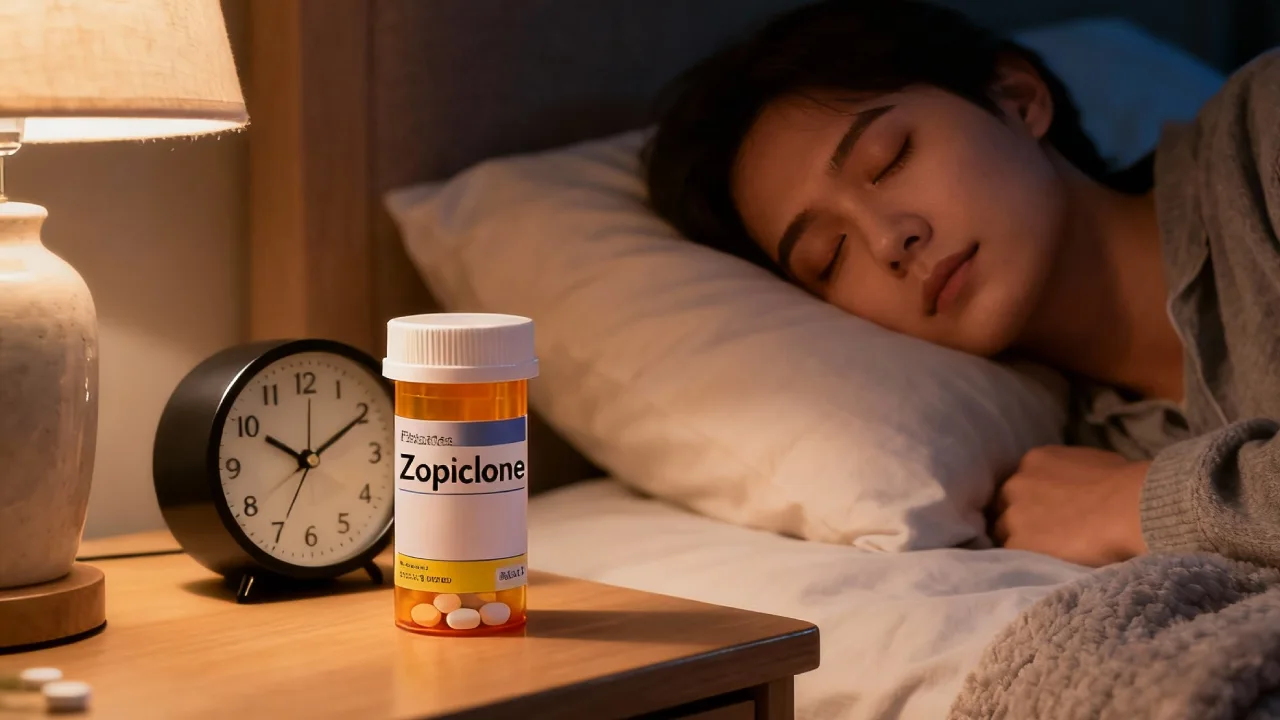Zopiclone, a popular prescription medicine for short-term insomnia relief, is widely used due to its fast action and effectiveness. However, like all sleep aids, there’s a risk of developing tolerance with prolonged or improper use. Tolerance reduces zopiclone’s effectiveness, compelling users to seek higher doses—thus increasing dependency risks and adverse effects. This article explains what zopiclone tolerance is, how it develops, and most importantly, how to avoid it safely and effectively for long-term well-being.[1][2]
What Is Zopiclone Tolerance?
Tolerance occurs when the body becomes accustomed to a drug, requiring more of it to achieve the same therapeutic effect over time. With medications like zopiclone, continued use—even at the prescribed dose—can make the brain less sensitive to its effects. As a result, sleep improves less, and restless nights may return.[3][2][1]
Zopiclone tolerance is a precursor to dependency and withdrawal. When patients become tolerant, they often increase their dosage, sometimes against medical advice, leading to physical and psychological dependence. Awareness and early prevention are essential to break this vicious cycle.[4][5]
Why Is It Important to Avoid Tolerance?
Tolerance not only diminishes the benefits of sleep medication but also creates substantial health risks:
- Increased risk of dependence and withdrawal
- More severe rebound insomnia
- Greater side effects (cognitive impairment, daytime drowsiness, falls)
- Potential for misuse and addiction[2][1][3]
Moreover, tolerance can develop in as little as a few weeks of continuous use, which is why medical guidelines recommend limiting zopiclone to the shortest period possible, typically not exceeding four weeks.[6][1][3]
Recognizing Signs of Zopiclone Tolerance
Early awareness is critical for prevention. Common signs include:
- Needing higher doses for the same effect
- Shorter duration of sleep benefit
- Cravings or urges to take more than prescribed
- Using zopiclone to relieve anxiety or stress outside sleeping needs[5][4][2]
If any of these symptoms appear, speak to a healthcare professional rather than adjusting the dose independently.[4][6]
Also Read: How Much Sleep Do You Really Need for Good Health?
Top Strategies for Avoiding Zopiclone Tolerance
- Follow Medical Guidance and Duration
The first and foremost step is adhering strictly to the prescribed dose and duration. Do not take zopiclone longer than four weeks unless specifically instructed by a doctor. Regular review and honest feedback with your healthcare provider can catch early signs of tolerance and facilitate timely medication adjustments.[1][6]
- Use Intermittently (“Drug Holidays”)
Some doctors recommend intermittent dosing, using zopiclone only on particularly bad nights rather than every single night. This approach gives your body time to “reset,” helping to preserve zopiclone’s efficacy and reduce the risk of tolerance development.[3][2]
- Do Not Increase Dosage Independently
Never increase your dose without consulting your doctor, even if the medication seems less effective. Increasing the dose speeds up the tolerance process and increases adverse event risks. Instead, discuss alternative sleep strategies or substitute medications with your provider if needed.[6][5]
- Focus on Sleep Hygiene and Healthy Habits
Non-drug interventions remain some of the most effective and safest methods for maintaining sleep quality without risking tolerance:
- Maintain a consistent sleep/wake schedule
- Avoid caffeine and alcohol, especially in the evening
- Limit screen time before bed
- Keep the bedroom dark, cool, and quiet
- Engage in regular physical activity[7][4]
These healthy habits can boost sleep quality naturally, lowering reliance on sleep medications like zopiclone.
- Gradual Tapering for Long-Term Users
If you have been using zopiclone for a prolonged period, stopping suddenly can cause rebound insomnia or withdrawal. Gradual tapering, supervised by your doctor, allows your body to adjust safely. This process may take weeks or months, depending on your usage history.[8][9][5][6]
- Explore Cognitive Behavioral Therapy (CBT)
CBT for insomnia (CBT-I) is a clinically proven therapy that addresses thoughts and behaviors related to poor sleep. It’s highly effective both as a primary intervention and alongside or after medication use. Numerous studies show that CBT-I helps prevent relapse and reduces the risk of medication tolerance.[7][4]
- Address Underlying Stress and Mental Health
Since stress, anxiety, or depression drive many sleep problems, long-term management may require more than medication. Consider counseling, stress management techniques, mindfulness, or therapy groups to build resilience and reduce the temptation to over-rely on sleeping tablets.[8][7][4]
- Build a Support Network
Having a network of family, friends, or peer groups provides emotional support, accountability, and practical strategies for coping with sleeplessness without increasing medication.[7][4]
What to Do If You Suspect Tolerance
If you suspect you’ve developed a tolerance to zopiclone, it’s important not to panic or abruptly stop use. Instead:
- Contact your healthcare provider for a medication review
- Discuss gradual dose reduction or alternative therapies
- Seek psychological or behavioral support if anxiety is present
- Avoid obtaining additional zopiclone outside legal channels
- Focus on developing healthy lifestyle routines during withdrawal[8][4][6][7]
Dangers of Ignoring Tolerance
Ignoring zopiclone tolerance increases the risk of:
- Dependence: Requiring the medication just to function normally
- Withdrawal: Anxiety, insomnia, nausea, shaking, in severe cases, seizures[7][8]
- Mental health deterioration: Worsening anxiety, depression, or cognitive difficulties
- Physical accidents: Daytime drowsiness can increase falls, especially in older adults[3]
Tolerance should always be a prompt to reassess sleep management plans with professional supervision.
Practical Tips to Sustain Healthy Sleep Without Zopiclone
- Practice a calming pre-sleep routine: Reading, gentle stretches, and relaxation or mindfulness exercises can prime your body for sleep.
- Track your sleep in a diary: Identify patterns or triggers for insomnia.
- Avoid clock-watching: This creates anxiety and can worsen sleeplessness.
- Seek medical review for persistent insomnia: Insomnia may signal underlying medical or psychological conditions needing specific treatment.[4][7]
Final Thoughts: Use Zopiclone Responsibly
Zopiclone can offer valuable relief for people struggling with short-term, severe insomnia, but only when used properly. The key to avoiding tolerance is short-term, minimal use in conjunction with lifestyle and behavioral changes. Regularly review your medication needs with your doctor, and consider all aspects of healthy sleep as part of a holistic plan.
Remember: Responsible use, ongoing communication with health professionals, and attention to overall well-being are the best ways to enjoy safe, effective sleep management without falling into the cycle of tolerance, dependence, or withdrawal.[2][5][1][6][3]
If you are struggling with insomnia or medication tolerance, speak with your health professional for individualized advice and safe management strategies.
References:
All information cited and consolidated from expert addiction and sleep clinics, therapy resources, and medical guidelines.
- https://www.recoverylighthouse.com/addiction/prescription-drug/sleeping-pills/zopiclone/
- https://www.primroselodge.com/prescription-drug-addiction/sleeping-pills/zopiclone/
- https://ebm.bmj.com/content/28/Suppl_1/A36
- https://www.ukat.co.uk/rehab-treatment/drug/prescription/sleeping-pills/zopiclone/
- https://gladstonesclinic.com/rehab-programme/pharmaceutical-addiction/zopiclone/
- https://nhssomerset.nhs.uk/news/document/zopiclone-tapering-document-june-2022/
- https://andybhatti.com/addictions/zopiclone-withdrawal/
- https://jintararehab.com/blog/zopiclone-dependency-the-struggle-to-quit/
- https://www.pharmxtra.com/blog/how-to-come-off-zopiclone
- https://pubmed.ncbi.nlm.nih.gov/6366822/





